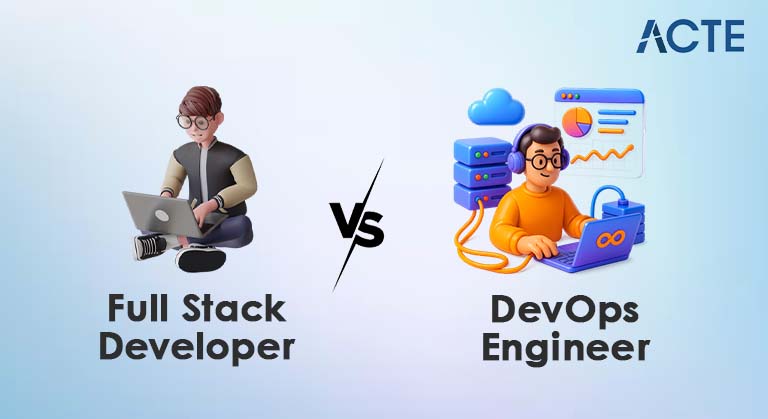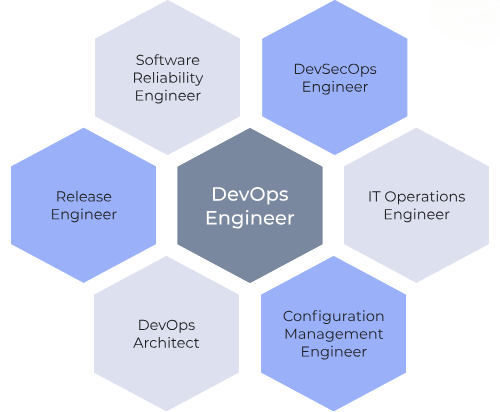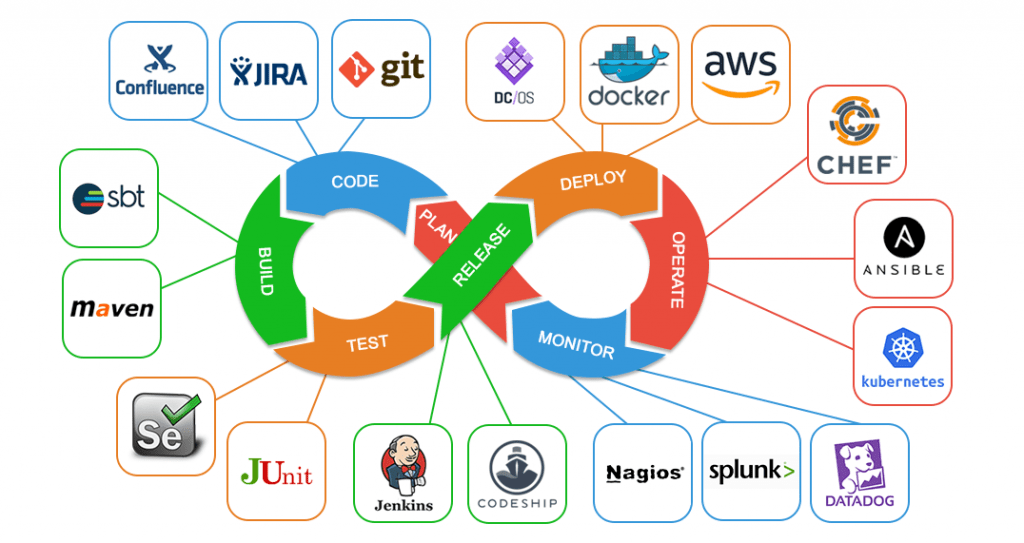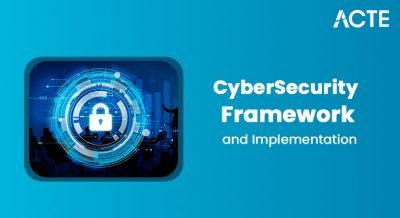
- Introduction to DevOps and Full Stack Development
- Roles and Responsibilities of a DevOps Engineer
- Roles and Responsibilities of a Full Stack Developer
- Core Skills Comparison
- DevOps Tools and Full Stack Developer Technologies
- Which One Should You Choose: DevOps or Full Stack Development?
- Future of DevOps and Full Stack Development Careers
- Conclusion
Tech world is rapidly evolving, with numerous career paths and specializations, two of which are DevOps Engineer and Full Stack Developer. Web Designing and Development Courses roles are vital for successfully deploying, maintaining, and scaling applications. Both professions have gained prominence as companies continue to embrace the rapid development and deployment culture. However, there are distinct differences in their focus, skill sets, and impact on an organization. In this article, we’ll explore both roles in detail, compare their core responsibilities, skills, and technologies, and help you decide which best suits your career aspirations.
Introduction to DevOps and Full Stack Development
- DevOps: DevOps is a cultural and operational approach emphasizing collaboration between development and IT operations teams. Its goal is to improve the software development lifecycle’s efficiency, speed, and quality (SDLC). DevOps combines practices like continuous integration (CI), continuous delivery (CD), automation, monitoring, and collaboration to ensure that software can be developed, tested, and deployed faster and more reliably. DevOps Engineers implement and maintain the infrastructure, tools, and processes that enable this approach. jQuery vs JavaScript responsibilities include creating automated pipelines, managing cloud services, ensuring system reliability, and monitoring production environments.
- Full Stack Development: A Stack Developer is a versatile developer capable of working on a web application’s front and back end. Complete Stack Development covers all software stack layers, from the user interface (UI) the end-user interacts with to the server, database, and application logic that processes the data. Full Stack Developers typically have expertise in multiple programming languages, frameworks, and technologies, enabling them to create end-to-end solutions for web applications. A Full Stack Developer’s role involves building the entire architecture of a website or application, including the client-side (frontend) and server-side (backend), while ensuring seamless integration between the two.
Become a Web Development expert by enrolling in this Web Development Training today.
Roles and Responsibilities of a DevOps Engineer
The DevOps Engineer is responsible for bridging the gap between development and operations. Below are some of the key roles and responsibilities of a DevOps Engineer:

- Continuous Integration and Continuous Delivery (CI/CD): Setting up and maintaining CI/CD pipelines automates code integration and delivery. This allows frequent, reliable updates to be pushed to production without disrupting services.
- Infrastructure Automation: Automating infrastructure provisioning using DevOps Tools like Terraform, CloudFormation, or Ansible. React Native Made Simple: Beginner’s Step-by-Step Guide reduces the need for manual intervention and ensures consistency across environments.
- Monitoring and Logging: Implementing monitoring solutions to keep track of system performance and usage. This includes setting up tools like Prometheus, Grafana, and ELK stack (Elasticsearch, Logstash, Kibana) to monitor the health of applications and services.
- Collaboration and Communication: Facilitating strong communication between development and IT operations teams, ensuring alignment on goals, processes, and responsibilities.
- Cloud Infrastructure Management: Managing cloud-based services (e.g., AWS, Azure, Google Cloud) to ensure the infrastructure scales appropriately and efficiently to meet the application’s demands.
- Incident Response and Troubleshooting:Responding to production issues, identifying root causes, and implementing fixes or improvements to ensure system reliability.
- Security Practices: Implementing security best practices such as infrastructure as code, vulnerability scanning, and access control to ensure that the systems are secure and compliant.
- Frontend Development: Creating the user interface (UI) using technologies like HTML, CSS, JavaScript, and frontend frameworks like React, Angular, or Vue.js. The goal is to make the application user-friendly and visually appealing.
- Backend Development: Build server-side logic using programming languages like Python, Java, Node.js, Ruby, or PHP. Full-stack developers work with frameworks like Django, Flask, or Express to create scalable and efficient server-side applications.
- Database Management: Designing and maintaining databases. Depending on the application’s needs, this could involve working with relational databases (like MySQL and PostgreSQL) or NoSQL databases (like MongoDB and Cassandra).
- API Integration: Developing and consuming RESTful or GraphQL APIs to enable communication between the frontend and backend applications.
- Version Control: Using version control systems like Git to manage Web Developer Certification Courses changes, collaborate with other developers, and maintain a history of application versions.
- Deployment and DevOps Collaboration: While Full Stack Developers may not be responsible for maintaining infrastructure, they often collaborate with DevOps teams to deploy applications, monitor their performance, and troubleshoot issues.
- Testing and Debugging: Writing unit tests and performing debugging to ensure that the application is stable and performs well.
- DevOps Core Skills: Automation Mastery of tools like Jenkins, Docker, Kubernetes, Terraform, and Ansible for automating deployment, testing, and infrastructure management. Scripting Proficiency in scripting languages like Bash, Python, or Ruby to automate tasks and processes. Cloud Platforms Expertise in using cloud platforms (AWS, GCP, Azure) for hosting applications and managing cloud resources. Containerization Familiarity with Docker and Kubernetes for managing containers and orchestrating microservices. System Administration Knowledge of operating systems (Linux, Windows), server management, and Django vs Node.js. Monitoring Tools Familiarity with tools like Prometheus, Grafana, Nagios, or ELK stack to monitor applications and infrastructure. CI/CD Practices Understanding and experience setting up and maintaining continuous integration and delivery pipelines.
- Complete Stack Developer Core Skills: Frontend Technologies Expertise in HTML, CSS, JavaScript, and popular frontend libraries like React, Angular, or Vue.js. Backend Technologies Proficiency in server-side programming languages like Node.js, Python, Ruby, Java, or PHP and backend frameworks like Django, Flask, or Spring. Databases Knowledge of relational (SQL) and non-relational (NoSQL) databases, including MySQL, PostgreSQL, MongoDB, etc. API Development Strong understanding of RESTful and GraphQL APIs, including how to develop and consume them. Version Control Proficiency in using Downloading Node Js and NPM and GitHub for version control and collaboration. Web Servers Experience with web servers such as Apache, Nginx, or Node.js for handling requests and serving static or dynamic content. DevOps Awareness Understanding basic DevOps principles such as continuous deployment, version control, and containerization (often in collaboration with DevOps engineers).
Advance your Web Development career by joining this Web Developer Certification Courses now.
Roles and Responsibilities of a Full Stack Developer
The Full Stack Developer is responsible for building both the client-side (frontend) and server-side (backend) of web applications. Their responsibilities typically include:
Core Skills Comparison

Start building modern websites and applications with guidance from experts—join this Web Development Course today.
DevOps Tools and Full Stack Developer Technologies
DevOps Tools and Technologies: DevOps Engineers primarily rely on tools that enable automation, continuous monitoring, and seamless integration between development and operations teams. Key tools in the DevOps ecosystem include version control systems like Git, GitLab, and Bitbucket. For continuous integration and continuous deployment (CI/CD), popular choices are Jenkins, GitLab CI, CircleCI, and Travis CI. Containerization and orchestration are handled using Docker, Kubernetes, and OpenShift. Infrastructure automation tools such as Terraform, CloudFormation, and Ansible help manage and provision infrastructure efficiently. DevOps professionals also work extensively with cloud platforms like AWS, Google Cloud Platform, and Microsoft Azure. Monitoring and logging are achieved through tools like Prometheus, Grafana, the ELK stack, and Nagios. For team collaboration and project management, tools like Slack, Jira, and Confluence are commonly used.
Full Stack Developer Technologies: A Full Stack Developer is expected to be skilled in both frontend and backend development. On the frontend, commonly used Control Statements in Java include HTML, CSS, JavaScript, and frameworks like React, Angular, Vue.js, and libraries such as Bootstrap. On the backend, developers often work with Node.js, Express.js, Django, Flask, Ruby on Rails, Java, and Spring Boot. Full Stack Developers also need to manage data using databases such as MongoDB, PostgreSQL, MySQL, and Redis. Knowledge of APIs, including RESTful APIs and GraphQL, is essential for connecting frontend and backend services. Version control is typically handled using Git, GitHub, or GitLab. Additionally, they work with web servers like Nginx, Apache, and Node.js to host and serve applications.
Are you getting ready for your Web Development interview? Check out our blog on Web Development Interview Questions and Answers!
Which One Should You Choose: DevOps or Full Stack Development?
Choosing between DevOps and Full-Stack Development depends on your interests, career goals, and the kind of work you enjoy. If you are more interested in the infrastructure side of things, enjoy automating processes, and want to work on improving the deployment and scalability of applications, Downloading Node Js and NPM DevOps might be a good fit for you. DevOps Engineers are crucial in ensuring smooth operations and system reliability, vital for large-scale projects and companies adopting continuous integration and delivery. If you enjoy both the creative aspect of building user interfaces and the technical challenges of developing server-side logic, then Full Stack Development may be a better choice. Full Stack Developers get to work on all layers of an application, which offers great flexibility and variety in day-to-day tasks.
Future of DevOps and Full Stack Development Careers
DevOps and Full-Stack Development are highly sought-after career paths with strong job prospects. As the demand for faster, more reliable software grows, DevOps Engineers and Full-Stack Developers will continue to be in high demand.
- DevOps Future: With the growing adoption of cloud computing, microservices, and continuous deployment, the need for skilled DevOps professionals is expected to rise. DevOps will remain integral to improving software delivery pipelines and maintaining system uptime, especially as businesses adopt more agile methodologies.
- Full Stack Development Future: Full-stack development continues to evolve with the rise of modern JavaScript frameworks and the increasing demand for dynamic, scalable web applications. Full-stack Developers will continue to be in demand as businesses seek to develop complex applications with a wide range of features.
Conclusion
DevOps and Full Stack Development offer exciting career opportunities but focus on different aspects of the development lifecycle. If Web Designing Training are passionate about automation, system infrastructure, and enhancing the efficiency of software delivery, DevOps might be your ideal path. On the other hand, if you enjoy building both the client-facing and server-side aspects of applications and want to work on diverse technologies, Full Stack Development could be the perfect fit. Ultimately, your choice should align with your skills, interests, and challenges you want to tackle in your career. Regardless of your chosen path, both fields are poised for continued growth and offer rewarding opportunities for those passionate about technology and innovation.




